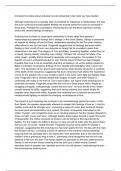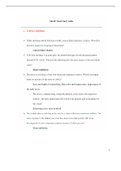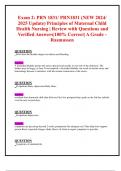Essay
Compare how ideas about enduring love are presented in two texts you have studied. Comparative essay on The Great Gatsby and the pre-1900 Poetry Anthology
- Module
- Love and Relationships
- Institution
- AQA
This A* grade timed essay compares ideas about enduring love in The Great Gatsby and the pre-1900 poetry anthology. It demostrates how to effectively weave between texts when comparing and contrasting techniques and ideas portrayed by authors. The essay has a strong focus on Gatsby's enduring love ...
[Show more]












